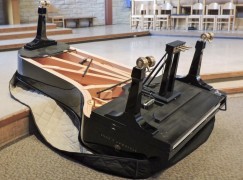Steinway goes chasing investors
NewsThe New York-based piano maker is readying itself for an Initial Public Offering, according to Wall Street reports. Yesterday, it submitted the necessary documents to the Securities and Exchange Commission in New York.
The company has been owned since 2013 by a billionaire, John Paulson.
The Chinese government tried to buy it in 2018, but was turned down.
Net income rose in 2021 by 14.4% to $59.3 million.
A new Steinway can cost anything from $60,000 to $350,000.






Comments